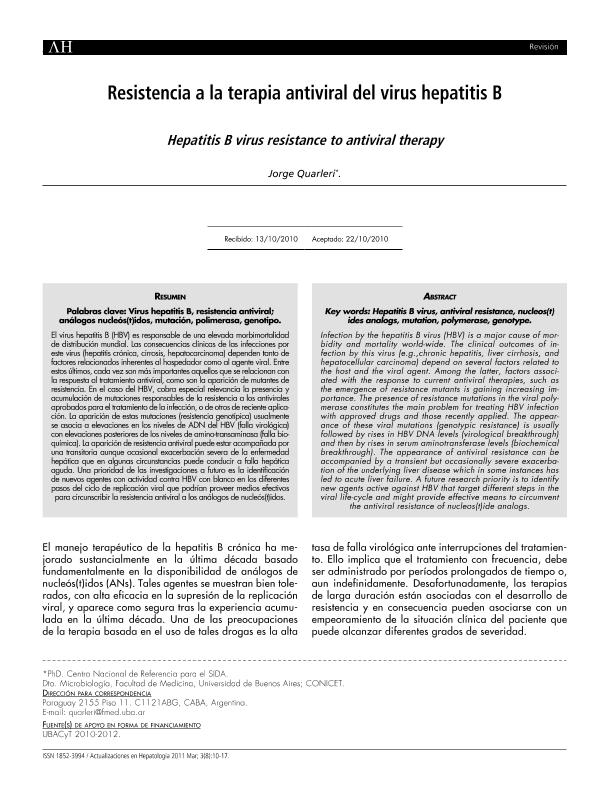Mostrar el registro sencillo del ítem
dc.contributor.author
Quarleri, Jorge Fabian

dc.date.available
2017-02-20T19:33:30Z
dc.date.issued
2011-03
dc.identifier.citation
Quarleri, Jorge Fabian; Resistencia a la terapia antiviral del virus de hepatitis B; Arkhetypo; Actualizaciones en Hepatología; 3; 8; 3-2011; 1-8
dc.identifier.issn
1852-3994
dc.identifier.uri
http://hdl.handle.net/11336/13177
dc.description.abstract
El virus hepatitis B (HBV) es responsable de una elevada morbimortalidad de distribución mundial. Las consecuencias clínicas de las infecciones por este virus (hepatitis crónica, cirrosis, hepatocarcinoma) dependen tanto de factores relacionados inherentes al hospedador como al agente viral. Entre estos últimos, cada vez son más importantes aquellos que se relacionan con la respuesta al tratamiento antiviral, como son la aparición de mutantes de resistencia. En el caso del HBV, cobra especial relevancia la presencia y acumulación de mutaciones responsables de la resistencia a los antivirales aprobados para el tratamiento de la infección, o de otros de reciente aplicación. La aparición de estas mutaciones (resistencia genotípica) usualmente se asocia a elevaciones en los niveles de ADN del HBV (falla virológica) con elevaciones posteriores de los niveles de amino-transaminasa (falla bioquímica). La aparición de resistencia antiviral puede estar acompañada por una transitoria aunque ocasional exacerbación severa de la enfermedad hepática que en algunas circunstancias puede conducir a falla hepática aguda. Una prioridad de las investigaciones a futuro es la identificación de nuevos agentes con actividad contra HBV con blanco en los diferentes pasos del ciclo de replicación viral que podrían proveer medios efectivos para circunscribir la resistencia antiviral a los análogos de nucleós(t)idos.
dc.description.abstract
Infection by the hepatitis B virus (HBV) is a major cause of morbidity and mortality world-wide. The clinical outcomes of infection by this virus (e.g.,chronic hepatitis, liver cirrhosis, and hepatocellular carcinoma) depend on several factors related to the host and the viral agent. Among the latter, factors associated with the response to current antiviral therapies, such as the emergence of resistance mutants is gaining increasing importance. The presence of resistance mutations in the viral polymerase constitutes the main problem for treating HBV infection with approved drugs and those recently applied. The appearance of these viral mutations (genotypic resistance) is usually followed by rises in HBV DNA levels (virological breakthrough) and then by rises in serum aminotransferase levels (biochemical breakthrough). The appearance of antiviral resistance can be accompanied by a transient but occasionally severe exacerbation of the underlying liver disease which in some instances has led to acute liver failure. A future research priority is to identify new agents active against HBV that target different steps in the viral life-cycle and might provide effective means to circumvent the antiviral resistance of nucleos(t)ide analogs.
dc.format
application/pdf
dc.language.iso
spa
dc.publisher
Arkhetypo
dc.rights
info:eu-repo/semantics/openAccess
dc.rights.uri
https://creativecommons.org/licenses/by-nc-sa/2.5/ar/
dc.subject
Hepatitis B
dc.subject
Resistencia
dc.subject.classification
Enfermedades Infecciosas

dc.subject.classification
Ciencias de la Salud

dc.subject.classification
CIENCIAS MÉDICAS Y DE LA SALUD

dc.title
Resistencia a la terapia antiviral del virus de hepatitis B
dc.title
Hepatitis B virus resistance to antiviral therapy
dc.type
info:eu-repo/semantics/article
dc.type
info:ar-repo/semantics/artículo
dc.type
info:eu-repo/semantics/publishedVersion
dc.date.updated
2017-02-15T14:08:35Z
dc.journal.volume
3
dc.journal.number
8
dc.journal.pagination
1-8
dc.journal.pais
Argentina

dc.journal.ciudad
Buenos Aires, Argentina
dc.description.fil
Fil: Quarleri, Jorge Fabian. Universidad de Buenos Aires. Facultad de Medicina. Departamento de Microbiología. Centro Nacional de Referencia del Sida; Argentina. Consejo Nacional de Investigaciones Científicas y Técnicas. Oficina de Coordinación Administrativa Houssay; Argentina
dc.journal.title
Actualizaciones en Hepatología
Archivos asociados
